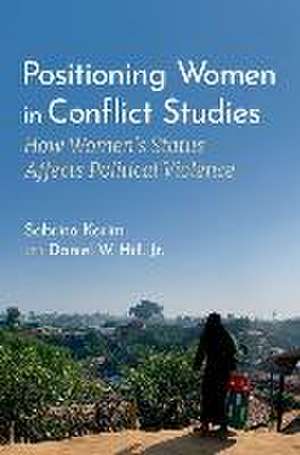Positioning Women in Conflict Studies: How Women's Status Affects Political Violence
Autor Sabrina Karim, Daniel W. Hill, Jr.en Limba Engleză Paperback – 19 dec 2024
| Toate formatele și edițiile | Preț | Express |
|---|---|---|
| Paperback (1) | 136.27 lei 10-16 zile | +36.63 lei 6-12 zile |
| Oxford University Press – 19 dec 2024 | 136.27 lei 10-16 zile | +36.63 lei 6-12 zile |
| Hardback (1) | 445.04 lei 31-37 zile | +99.89 lei 6-12 zile |
| Oxford University Press – 19 iun 2024 | 445.04 lei 31-37 zile | +99.89 lei 6-12 zile |
Preț: 136.27 lei
Preț vechi: 155.45 lei
-12% Nou
Puncte Express: 204
Preț estimativ în valută:
26.08€ • 27.29$ • 21.70£
26.08€ • 27.29$ • 21.70£
Carte disponibilă
Livrare economică 26 februarie-04 martie
Livrare express 22-28 februarie pentru 46.62 lei
Preluare comenzi: 021 569.72.76
Specificații
ISBN-13: 9780197757949
ISBN-10: 0197757944
Pagini: 328
Dimensiuni: 150 x 226 x 23 mm
Greutate: 0.45 kg
Editura: Oxford University Press
Colecția OUP USA
Locul publicării:New York, United States
ISBN-10: 0197757944
Pagini: 328
Dimensiuni: 150 x 226 x 23 mm
Greutate: 0.45 kg
Editura: Oxford University Press
Colecția OUP USA
Locul publicării:New York, United States
Recenzii
Karim and Hill's book presents a provocative argument about conceptualizing and measuring women's status in political violence research. By providing cogent critiques coupled with practical solutions, their arguments have important implications for both scholars and policymakers. The result is an analysis that offers conceptual and definitional clarity, rigorous empirical tests, and new directions for future research on a critical topic.
Karim and Hill's important new book is a tour de force, integrating theory, history, and empirics to demonstrate which dimensions of the situation of women are related to political violence. If you are interested in explaining state violence, domestic terror, or civil and inter-state conflict, this book will make a valuable contribution to your understanding. For example, state violence is far more likely if women are prominent in public dissent, while domestic terror is related to the rigidity of beliefs concerning women's roles in a society. Critically, harm to women emerges as highly predictive of conflict. Highly recommended.
This book makes significant advancements in the study of gender and political violence. Karim and Hill move beyond a traditional emphasis on gender inequality and derive four dimensions of women's status with Bayesian measurement models. In contrast to many other studies, their empirical findings show that these women's status dimensions do not always correspond to less frequent terrorism, civil wars, or interstate disputes. This book is a must-read for gender and conflict scholars.
Karim and Hill's important new book is a tour de force, integrating theory, history, and empirics to demonstrate which dimensions of the situation of women are related to political violence. If you are interested in explaining state violence, domestic terror, or civil and inter-state conflict, this book will make a valuable contribution to your understanding. For example, state violence is far more likely if women are prominent in public dissent, while domestic terror is related to the rigidity of beliefs concerning women's roles in a society. Critically, harm to women emerges as highly predictive of conflict. Highly recommended.
This book makes significant advancements in the study of gender and political violence. Karim and Hill move beyond a traditional emphasis on gender inequality and derive four dimensions of women's status with Bayesian measurement models. In contrast to many other studies, their empirical findings show that these women's status dimensions do not always correspond to less frequent terrorism, civil wars, or interstate disputes. This book is a must-read for gender and conflict scholars.
Notă biografică
Sabrina Karim is the Hardis Family Assistant Professor in Government at Cornell University. She directs the Gender and Security Sector Lab funded by Global Affairs Canada and is a recipient of a National Science Foundation Faculty Early CAREER Development Award. Her research focuses on international involvement in security assistance to post-conflict states, gender reforms in peacekeeping and domestic security sectors, and the relationship between gender and violence. She is the co-author of Equal Opportunity Peacekeeping: Women, Peace, and Security in Post-Conflict States. Daniel W. Hill, Jr., is an Associate Professor of International Affairs at the University of Georgia. His research focuses on violent political conflict, human rights, and international organizations and law. He has published on a variety of topics, including international human rights law and NGOs, state repression, police violence, terrorism, and quantitative methodology.
